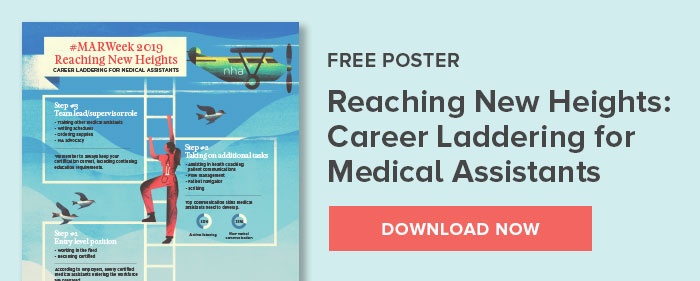Medical assistants (MAs) play a vital role in the delivery of healthcare, often being one of the first interactions patients have at their physicians’ offices. With a shortage of providers on the horizon, practices will continue to rely heavily on medical assistants to keep practice operations smooth while providing high-touch patient care.
For Medical Assistant Recognition Week 2019, the team at NHA interviewed certified clinical medical assistants to learn what it’s like to work in the role today and what they hope for the futures of their careers.
Read on to learn three reasons why these team players enhance healthcare. And, don’t forget to recognize the MAs at your organization for the hard work they do every day to help patients.
1. MAs are committed to providing the care patients need, helping them achieve health goals.
Patient care is the core of most medical assistants’ responsibilities. Every day, medical assistants listen and communicate with patients who come from different backgrounds. It’s their job to truly hear their needs and find a way to share those needs with the nurses and physicians on their teams.
“Patient care is challenging, but I love it. Patients’ needs are always different and changing and trying to decipher how patients’ needs are met can be challenging,” explains Stephanie Wilson, a medical assistant at Anne Arundel Medical Center in Annapolis, Maryland. “Some patients like to get right to the point and others want to know every detail.”
Ashley Reed, a medical assistant at MidMichigan-Orthopedic Office in Alpena, Michigan, shares that she knows she’s made a connection when she can make a patient smile. “Medical assistants are the heart of healthcare and we are always there for anyone and everyone,” she says. “We are eager learn and take on challenges every day.”
2. Despite how challenging their jobs can be, MAs want to continually learn and take on additional responsibilities.
At the beginning of a medical assistant’s career, he or she may be focused primarily on administrative and clinical duties while learning how to best serve patients as individuals. With every day bringing new challenges, mastering the job takes time and continual learning.
“I’m the youngest and newest medical assistant in my office, so I’m always going to the other medical assistants asking questions to get a better understanding of things,” says Natori Fowler, a medical assistant at OSU Physicians in Columbus, Ohio. “I hope one day a new medical assistant can come to me for advice and answers.”
Medical assistants who’ve been in the role for some time may be ready to take on additional responsibilities, including managing and teaching other medical assistants.
For example, Paula Salsman, a medical assistant for St. Luke’s Children’s Hospital in Boise, Idaho, is currently working toward becoming a preceptor in the hospital’s pediatric forensic department so that she can teach MAs and other clinicians.
Stephanie has taken on additional responsibilities over time, currently working as a practice clinical educator. “I love teaching classes and supporting MAs that have just started in the healthcare field,” she says.
3. MAs have strong aspirations for their careers.
Though all the MAs we interviewed expressed how much they love their work as an MA, they are working to pursue higher levels of responsibility in their careers. Some of the MAs indicated they’ll seek additional education to help them achieve their career goals.
Kathrynn Dunn-Phillips, a medical assistant at Northlake Gastroenterology Associates in Covington, Louisiana, says she hopes to climb the nursing ladder: “My goal is to become an RN with a BSN, then eventually my master’s in nursing.”
Monique Hopgood-Willis, a medical assistant at Ankle and Foot Centers of Georgia, in Buford, Georgia, would like to work toward a specialty role as a neurology physician assistant.
Paula also has ambitious plans: “My long-term career goal is to further my education, which I am currently doing, by obtaining my bachelor’s degree in health science.”
Stephanie, on the other hand, is hoping to ladder in her career to a management role: “I am hoping to achieve a leadership position that allows me to have the best of both worlds—providing patient care while also leading a team of other MAs and healthcare professionals to be great.”
No matter the career goal, it’s clear that MAs are dedicated to helping patients and fellow coworkers achieve the best results possible. After all, as Ashley says, they are the heart of healthcare.





